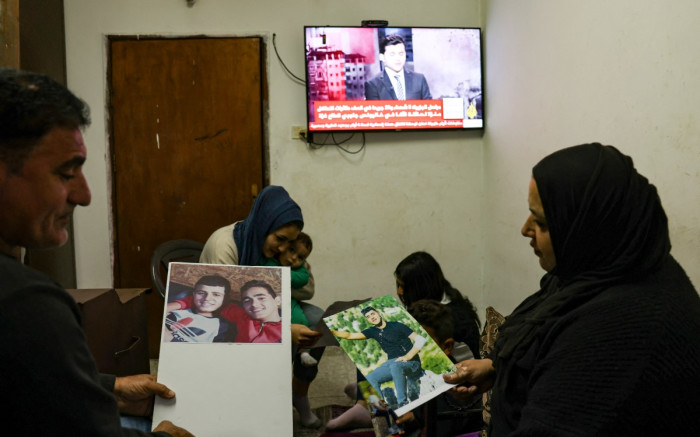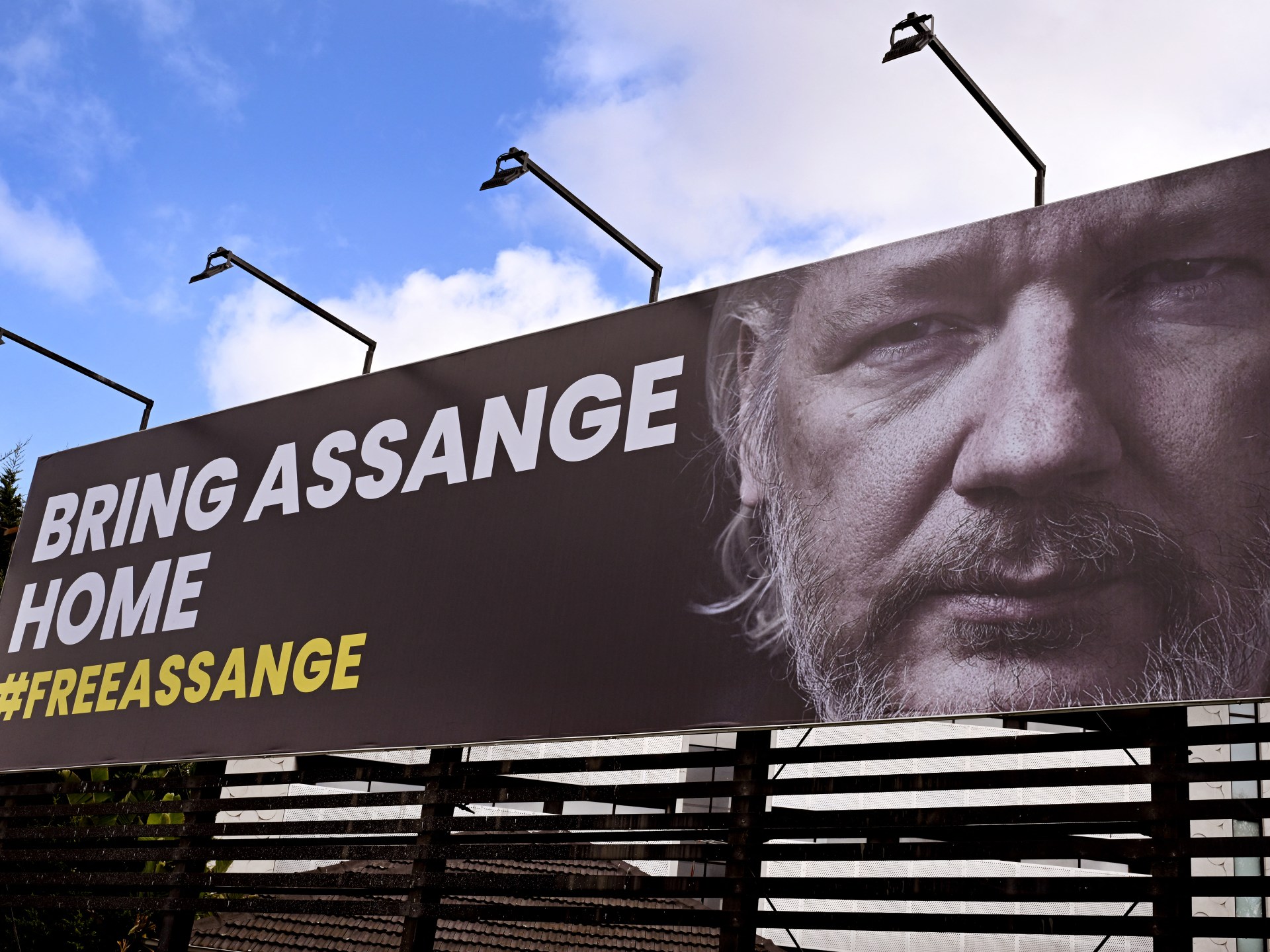
The delay is a blow to families desperate for their loved ones to return home and to more than two million people in the Gaza Strip who are praying for an end to 47 days of war and destruction.
Family members and relatives of Palestinian Ubay Abu Maria, who has been trapped in Israel since last August, hold his pictures in the village of Beit Omar, north of the occupied West Bank city of Hebron, on November 22, 2023.
JERUSALEM – Israel said a four-day ceasefire in the Gaza Strip and the release of hostages would begin no earlier than Friday, stalling a landmark deal to end the brutal and bloody seven-week war.
Israeli national security adviser Tzachi Hanegbi indicated that the release of at least 50 Israeli and foreign hostages held by Hamas was on track but would not occur until Friday at the earliest.
“Contacts to release our hostages are progressing and ongoing,” he said in a statement.
“The start of publication will take place in accordance with the original agreement between the parties and not before Friday.”
A second Israeli official said there would also not be a cessation of fighting on Thursday as expected.
The delay is a blow to families desperate for their loved ones to return home and to more than two million people in the Gaza Strip who are praying for an end to 47 days of war and destruction.
Under the complex and carefully choreographed deal, Israel and Hamas militants agreed to a four-day ceasefire that would see the release of at least 50 hostages captured in the deadly Oct. 7 attacks.
Three Americans, including three-year-old Abigail Mor Idan, were among the hostages to be released.
For every ten additional hostages released, there would be an additional day of “cessation of fighting,” according to an Israeli government document.
In return, Israel would release at least 150 Palestinian women and children and allow more humanitarian aid into the coastal area after weeks of bombing, intense fighting and a devastating siege.
It was not immediately clear what caused the delay or whether it indicated a serious error in implementation.
The agreement was expected to come into force on Thursday, despite strong opposition from some members of Israel’s far-right government.
Hardline Interior Minister Itamar Ben-Gvir called the deal a “historic mistake” that would embolden Hamas and risk the lives of Israeli troops.
An estimated 240 hostages were taken by Hamas and other Palestinian gunmen in bloody raids in Israel on October 7 that are also believed to have killed 1,200 people.
The shock attack sparked a fierce Israeli offensive in the Hamas-controlled Gaza Strip, killing more than 14,000 people, according to authorities there.
Most of the casualties on both sides are said to be civilians, although the exact numbers could not be independently verified.
Israel’s embattled Prime Minister Benjamin Netanyahu has backed the deal with Hamas brokered by Qatar, the United States and Egypt, but promised it will be temporary and will not end the campaign to destroy Hamas.
“We are winning and we will continue to fight until absolute victory,” he said on Wednesday, pledging to protect Israel from threats from Gaza and Lebanon, home to Iran-backed Hezbollah fighters.
Tensions rose on Israel’s northern border early Thursday after Hezbollah said five fighters, including the son of a senior lawmaker, were killed.
A source close to Hezbollah leader Abbas Raad’s family told AFP that his son and others were killed in an Israeli attack on a house in Beit Yahun, southern Lebanon.
Since the Israel-Hamas war began on October 7, there have been almost daily exchanges of fire on the Lebanon-Israel border, raising fears that the Gaza war could spark a wider conflagration.
The Israeli army said in statements on Wednesday evening that it had struck a number of Hezbollah targets, including a “terror cell” and infrastructure.
In Washington, the White House said President Joe Biden spoke with Netanyahu on Wednesday and “emphasized the importance of maintaining calm on the Lebanese border as well as in the West Bank.”
The White House has urged Israel not to escalate clashes with Hezbollah for fear of triggering a war that could pit U.S. and Iranian forces.
‘PAIN IN MY HEART’
Families on both sides struggled with uncertainty about how the releases would proceed.
“We don’t know who is coming out, because every evening Hamas will publish the names of those who are coming out the next day,” said Gilad Korngold, whose son and daughter-in-law are being held in Gaza along with their two children and other relatives.
Israel’s list of eligible Palestinian prisoners included 123 prisoners under the age of 18 and 33 women, including Shrouq Dwayyat, who was convicted of attempted murder in a 2015 knife attack.
“I was hoping she would make a deal,” said her mother, Sameera Dwayyat, but added that her relief was tempered by “great pain in my heart” over the dead children in Gaza.
In Khan Yunis in the southern Gaza Strip, war-weary, displaced Palestinians remained skeptical of the deal between Israel and Hamas.
“What truce are they talking about? We don’t need a ceasefire just so help can come. We want to go home,” said Maysara Assabagh, who fled the northern Gaza Strip to a hospital that now houses some 35,000 displaced people.
Large parts of the Gaza Strip have been leveled by thousands of airstrikes and the area is lacking food, water and fuel.
For now, Israel appeared to be pressing ahead with its offensive in the northern Gaza Strip, with witnesses reporting attacks on Kamal Adwan Hospital and surrounding homes.
Medical staff treated bloodied, dust-covered survivors as other residents fled to safety through rubble-strewn streets.
At Gaza’s largest hospital, Al-Shifa, Israeli soldiers escorted journalists to a tunnel shaft they said was part of a vast underground network used by Hamas for military purposes – a claim Hamas denies.
At a square in Tel Aviv now known as Hostages Square, 49-year-old Doron Klein said he was “hopeful” child hostages would come home but said the deal could pose “risks” to the military operation .
“I think everyone fears that this will give Hamas time to reorganize and that we will have to pay the price of more soldiers being killed,” he said.






Recent Comments